10 Awesome TED Talks to Live a Healthier Life

Put in your earbuds and get a dose of now-you-know.
TED, the nonprofit platform committed to ideas worth spreading, is one heck of a treasure trove. If you’re looking for the next innovative vision, TED is the place to go—and healthy living and eating inspo is no exception!
It all began as a conference in 1984 where technology, entertainment, and design came together and created a platform like no other. TED Talks are the videos of the best talks and performances from the TED Conference, where the world’s leading thinkers and doers give the talk of their living in around 18 minutes. Speeches that are inspiring, motivating, and really get the creative juices flowing are all part of the overall message of TED.
At Eat This, Not That!, we constantly have our finger on the pulse of health news, food trends, and the science behind our lifestyle habits and consequences. So, what better place to turn to inspiration than our friend TED? We scoured the archive of videos for a handful of awesome videos (you can also just download the audio!) to watch or listen to during your next dinner-cooking or elliptical-climbing session. For more energizing ideas, check out these 40 Tips for Motivation That Actually Work, too!
A SIMPLE WAY TO BREAK A BAD HABIT
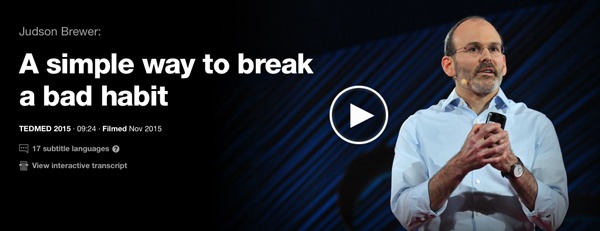
Judson Brewer is an expert in mindfulness training for addictions. From overeating to serious drug dependency, he has developed a treatment for them through neural mechanisms of mindfulness. During this TED talk, he discusses the natural reward-based learning process humans adapt to through positive and negative reinforcement and how the relationship we have with addiction can be broken through curiosity. Judson has found a simple answer to defeating the cravings and habits that we may not even know are bad for us. Whether it’s the food we’re eating or the hobbies that we’ve taken too far, breaking a habit is something everyone can look into in order to live healthier. Not sure if you’re guilty of anything? Find out 40 Habits That Make You Sick and Fat.
WHAT MAKES A GOOD LIFE? LESSONS FROM THE LONGEST STUDY ON HAPPINESS
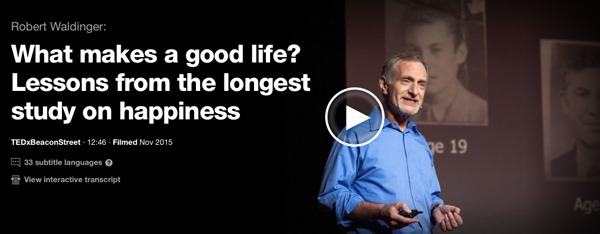
This talk is based on The Harvard Study of Adult Development, the longest study of adult life that’s ever been done. This 75-year-long study was done to find out what really keeps us healthy and happy through life. Dr. Robert Waldinger, the director of the study, tells us that two groups of men were studied, sophomores from Harvard and boys from one of Boston’s poorest neighborhood. Every two years these participants were interviewed about their lives, their medical records and brain scans were looked at and their children and wives were talked to. The biggest takeaway from the study was how vital it is to have good relationships with others in your lifetime. Social connections keep us from loneliness (and loneliness can lead to shorter, toxic lives). Instead of worrying about how many friends you have, the quality of those relationships is what we should care about. Don’t miss these data-backed tips on 30 Ways to Be Happier This Year!
INSIDE THE MIND OF A MASTER PROCRASTINATOR
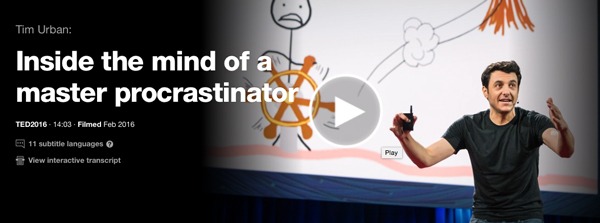
Are you a procrastinator? Tim Urban’s hysterical speech goes into the minds of procrastinators and what makes them wait until last minute to get things done. Tim became one of the most popular writers on the internet with his blog Wait But Why. With stick-figure illustrations, Urban shows us his version of what it looks like to be a procrastinator and how he pushes off his most important responsibilities. By stopping and looking at how much time procrastinating is actually taking up in our lives we see how wasted that time becomes and makes you think about what that time could be spent doing instead. He discusses methods to manage your time better and take control of your life in a way that allows you to enjoy life without constantly holding off the things that need to get done.
WHY SOME PEOPLE FIND EXERCISE HARDER THAN OTHERS
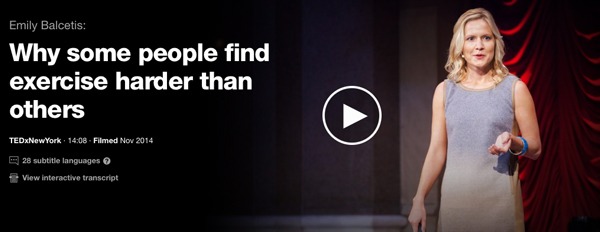
We all perceive the world differently. Here, Emily Balcetis speaks about how we all see the world through our own minds. She focuses on what influences us to view health and fitness differently from each other. The level of difficulty for someone to exercise varies based on the way we look at it. She did studies that tested people in a race after measuring their hip-to-waist circumference ratio, a objective assessment of people’s fitness, and asking them to estimate the distance. The fitter perceived the race as shorter. She does similar tests based on people’s motivation that have the same findings. She uses the “keep your eyes on the prize” strategy to see if the focus changes perceptions. This is a strategy to help promote a healthy lifestyle for people who don’t normally exercise to actually perform better. This speech is telling of how powerful our minds can be—and how we can each teach ourselves to see differently and progress.
HOW AN OBESE TOWN LOST A MILLION POUNDS
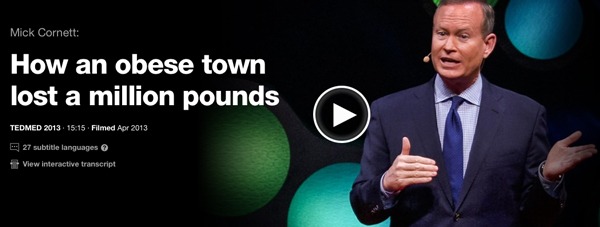
Oklahoma City was coming out a slumbering economy when Mick Cornett was voted for mayor. After taking office, OKC was put on the list of most obese cities in the country, and he decided he was going to do something about it. Something big. The city together was going to lose one million pounds. With the city becoming more popular in interest, he took a look around and realized it was a great place to live—for a car. Obese at one time himself, Cornett knew this was going to take a lot of change. He wanted to change the lifestyle of the citizens by building parks, wellness centers, inner city programs, a bike trail master plan, hundreds of miles of sidewalks, and much more in order to reach this goal. The goals were met and the results were overwhelmingly successful. This mayor shifted the entire culture and demographic of the city, landing themselves 22nd on the same publishers list of fittest cities in the US.
HEALING THROUGH DIET
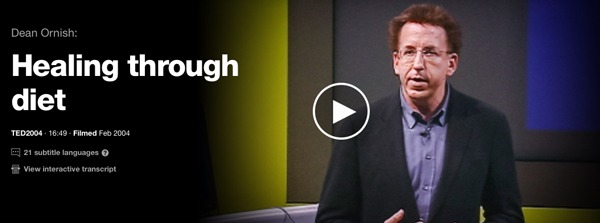
Dean Ornish, a physician, author and clinical professor at UCSF, speaks about how to live longer and enjoy it too. He promotes a balanced, holistic lifestyle that uses the joy of living rather than the fear of dying as his motivation. Your diet should be customized based on your degree of health in order to find the most peace and happiness. Diets are not just to lower blood pressure, manage stress and loss weight, they’re also to feel happiness. Ornish suggests a diet we are big fans of—removing simple carbs and replacing them with fruits, vegetables, whole grains and beans in their natural form, similar to the Mediterranean Diet. Kick the bad habits and avoid fad diets that help you lose weight but don’t make you genuinely happy, instead it has to be a lifestyle change. Without happiness, loneliness and depression kick in and you’re more likely to get sick and die earlier. Our diet has such major effects on the rest of our body, both inside and out, so it’s important to manage it in a way that will lead you to living the fullest.
TEACH EVERY CHILD ABOUT FOOD
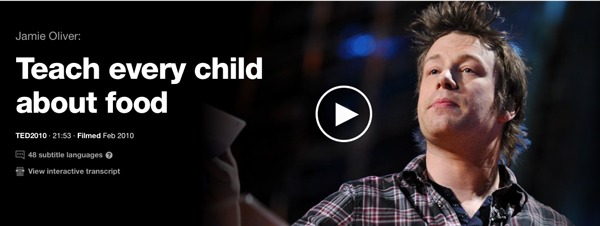
Teaching every child about food is Jamie Oliver’s dream in this TED talk. A well known chef and activist, he presents us with the awful reality of the health in America and how relevant diet-related disease has become. Oliver shows clips of his visits to homes and schools in West Virginia, the unhealthiest state in the US, to find out what’s behind these statistics. He discovers the harsh realization that kids cannot identify foods and the home pantry items and school kitchens are killing our kids before we know it. He aspires this country to wean off the sugar and other “nonfood” ingredients that we’re so adapted to and bring back real food by teaching the basic life skill of cooking at a young age. Oliver, being from England, recognized that it may sound strange that he has taken such an interest in America’s health. But he points out how prominent America is globally and the tremendous changes that can be followed, once we have changed them first.
HOW TO LIVE TO BE 100
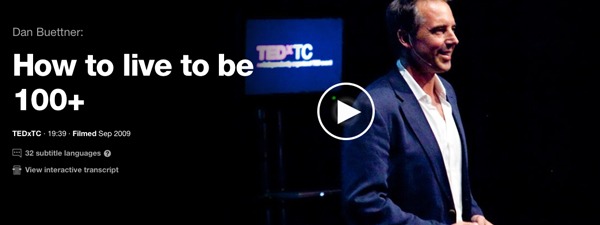
We all want to live a long life. As a writer and explorer for National Geographic, Dan Buettner studied the communities whose elders have done just that, live energetic lives at a record-setting age, known as the world’s “Blue Zones”. How we act, eat, exercise and live our daily lives have major influence on our longevity. There is no short term fix for longevity and Buettner uncovers the 9 common diet and lifestyle habits that are apparent within all of these communities that are keeping them active beyond the age 100. Along with good genes, moving naturally, eating wisely, connecting with others and having a good outlook were a few amongst the 9 that can make a huge difference in your life. (Psst! Find out about our brand-new diet plan to live a longer, leaner life.
HOW TO STAY CALM WHEN YOU KNOW YOU’LL BE STRESSED
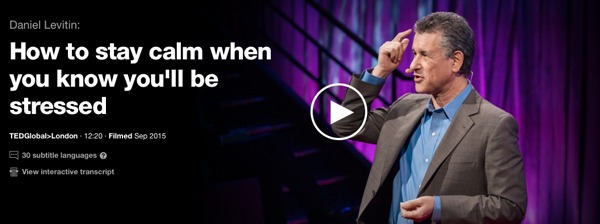
A stressed-out you is not the real you, and neuroscientist Daniel Levitin thinks that there is a way to avoid those critical mistakes we often make when we’re in stressful situations. Pre-mortem is the strategy he discusses where you look ahead and try to figure out everything that can possible go wrong and then figure out how those things can be prevented or minimized. Practicing this type of thinking and recognizing that things can go awry, but we should train ourselves to be best prepared for those situations.
HOW TO MAKE STRESS YOUR FRIEND
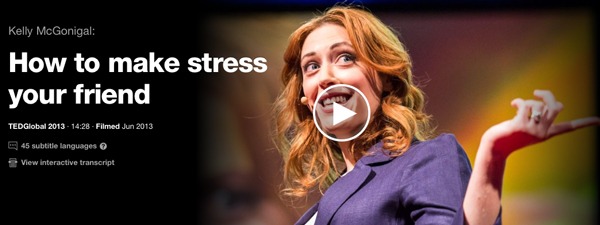
Kelly Mcgonigal wants to rethink the entire approach we have with stress. Over the course of her study, she found that believing that stress is bad for you is actually worse for your health than being stressed. By changing the way we think about stress, or body’s response to stress can change too. The neurohormone that stress releases called oxytocin is something that actually makes you social and craves physical contact, increases empathy and make you more willing to support the people you care about. Sometimes we even connect more with others when we’re under stress to create resilience. But these are not the properties of stress that we familiarize ourselves with. Mcgonigal wants to redefine the light we shed on stress and how we can react differently to it to make us happier and healthier. After you hear her TED talk, tune into these 12 Inspiring Yoga Mantras to Change Your Life to keep the zen going!








